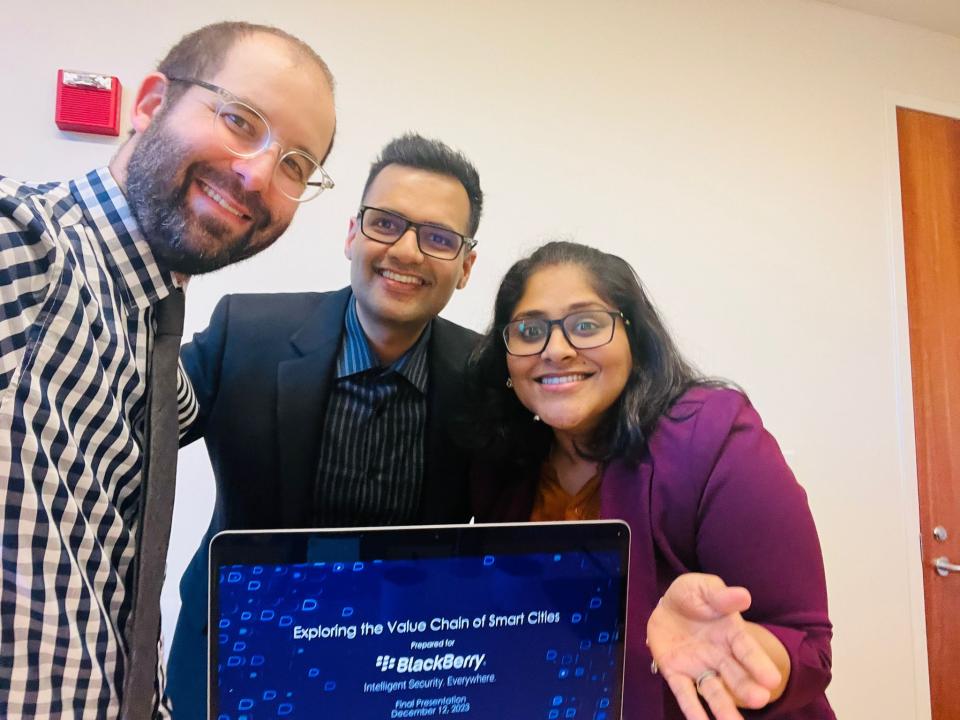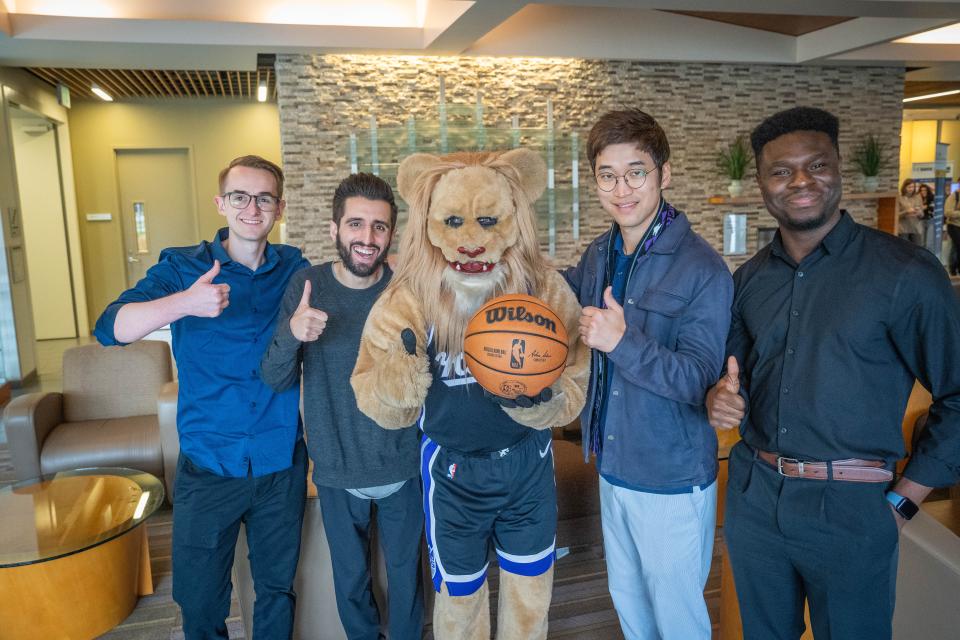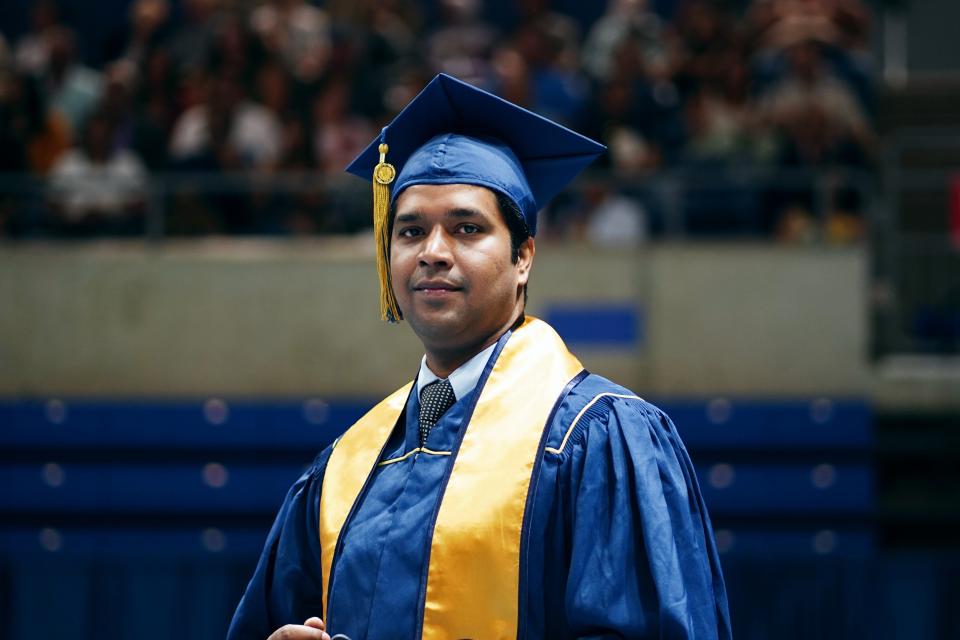Beyond Smartphones: MBA Team Explores BlackBerry's Future Potential
Recommending cybersecurity technologies and sustainable smart city solutions

You might remember or even wore out your thumbs typing messages on a BlackBerry® mobile device in the first decade of the 2000s. The clickable, addictive keyboards were hot and there were 85 million BlackBerry subscribers worldwide at its peak in 2011.
Yet like many tech companies, BlackBerry lost its dominant market share and had to pivot with the rise of the Android™ and iOS® platforms.
BlackBerry, based in Canada, successfully pivoted to specialize in intelligent security software and services for enterprises and governments worldwide, including mobile productivity tools and platforms.
The Nexus of Cybersecurity, IoT and Smart Cities
I recently had the opportunity to lead a team of UC Davis MBA students on a 10-week strategic project for BlackBerry. We partnered with BlackBerry executives and offered our recommendations on how best to navigate the global landscape assessment of smart cities use-cases applicable to various BlackBerry technologies.

My teammates, Angelina Cayabyab, Bradley Gable, Sriranjani Ramachandran, Vaibhav Singh and I researched and analyzed potential business opportunities for applying BlackBerry's Internet of Things (IoT) and cybersecurity technologies to sustainable smart city solutions worldwide.
The intersection of cybersecurity and “smart city” technologies holds immense potential. Traffic control, monitoring water usage, and emergency response communications are all critical smart city applications that government leaders are exploring.
However, integrated government and private/public mobile applications are also susceptible to security breaches. The promise of “real-time” optimization of basic urban infrastructure can only be realized if those systems are reliable and secure.
This understanding formed the foundation of our Integrated Management Project. This is the capstone experience in the UC Davis MBA program, where student teams put their collective business skills and knowledge to work on a quarter-long project to develop solutions for the project's sponsor. In this case, the corporate partner was BlackBerry.
The project's scope was developed originally by BlackBerry in collaboration with Spring Theory. Spring Theory partners with many schools, including the UC Davis Graduate School of Management, to generate projects that provide students outstanding, "real-world" opportunities to address complex issues.
Our Strategy: Understanding the Scope and Defining Value
Our project’s scope for BlackBerry spanned a range of issues that included market needs, funding streams, and sales cycle timing. It was an exciting, yet, initially, daunting challenge.
Our primary contact at BlackBerry, Noah Campbell, and our advisor, Lecturer Keith Weissglass, supported our project with timely insights. Their support allowed us to channel our team’s cumulative expertise and put our collective MBA skills and knowledge to a solution that BlackBerry could apply to its sales and marketing plans.
At the project’s kick-off meeting, Campbell helped refine the scope. As team lead, I then used this feedback to create a comprehensive scoping document that summarized our core objectives and a detailed project work plan.
Our project plan included two major legs of research and analysis: a global landscape assessment and use-case research.
The global landscape assessment involved analyzing countries on their readiness, capability, and likely prioritization of implementing smart city technologies.
The use-case research assessed BlackBerry's product and service offerings to determine which use cases and applications could best leverage BlackBerry’s services while delivering the maximum benefit and impact under various smart city scenarios.
Earning BlackBerry’s Applause for Our Recommendations
Some of the project risks included trying to analyze too many countries, which was not practical in a 10-week timeframe, and not focusing on a realistic set of potential use cases for BlackBerry’s powerful array of products and services.
However, we recognized these risks early on and devised a methodology that allowed us to evaluate whether each country or use-case alternative could meet a rigorous set of criteria.
One key throughout the project was regular check-ins with Campbell at BlackBerry to ask for feedback. He was generous with his time, expert advice, ingenious analogies, and guidance at critical junctures, which were instrumental in keeping us focused and productive.
Our team’s interim presentation (at the project’s midpoint) provided important feedback on efforts expended during the first half of the project. BlackBerry appreciated our rigorous approach and confirmed we were on the right track. We moved forward on researching specific recommendations and tangible opportunities for BlackBerry to pursue.
I found this phase exceptionally challenging. We faced persistent data challenges four weeks before our final presentation!
However, this predicament also made us realize we were on the verge of a breakthrough. Our analysis revealed that the most promising and actionable opportunities were likely to be ones that were not already well-publicized.
Leveraging the extensive consulting expertise of our advisor Weissglass, we evaluated multiple and diverse sources of information and then filtered that information through our rigorous screens to identify specific opportunities.
With our analysis and recommendations in hand, we felt both nervous and excited as we prepared for our final presentation to BlackBerry’s senior marketing and sustainability leaders.
We showcased our approach and findings, backed by evidence and early market indicators.
The BlackBerry group complimented our rigorous methodology, which was readily explainable so that we could answer all audience questions. Our team was thrilled to receive enthusiastic feedback—and even applause!
Our findings were directly relevant to several of BlackBerry’s public sector sales and marketing initiatives.
We identified several relevant countries and use-cases for BlackBerry’s product offerings. Our final recommendations also reflected and aligned with country-specific funding and sales cycle timing.
This comprehensive approach ensured that our recommendations were strategic in the long-term and also practical and actionable sooner than expected.
As the team lead, I learned a great deal during the project and further honed my skill of motivating a team amid uncertainty, pushing our boundaries to work collaboratively to define, optimize, and deliver value for our sponsor.
My classmates and I have all earned our MBAs now, pursuing our professional and personal goals. The project for BlackBerry gave each of us insights that we will use throughout our careers and lives!


